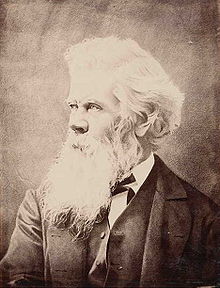
Back هنري باركس Arabic هنرى باركس ARZ Henri Parks AZ Henry Parkes German Henry Parkes Spanish Henry Parkes EU Henry Parkes French Henry Parkes Malay Паркс, Генри Russian Henry Parkes Swedish
The Honourable Sir Henry Parkes | |
|---|---|
 | |
| 7th Premier of New South Wales | |
| In office 14 May 1872 – 8 February 1875 | |
| Monarch | Victoria |
| Governor | Sir Hercules Robinson |
| Preceded by | WAS; Sir James Martin |
| Succeeded by | WAS; Sir John Robertson |
| Constituency | Mudgee East Sydney |
| In office 22 March 1877 – 16 August 1877 | |
| Monarch | Victoria |
| Governor | Sir Hercules Robinson |
| Preceded by | Sir John Robertson |
| Succeeded by | Sir John Robertson |
| Constituency | East Sydney |
| In office 21 December 1878 – 9 January 1883 | |
| Monarch | Victoria |
| Governor | Sir Hercules Robinson Augustus Loftus |
| Preceded by | James Farnell |
| Succeeded by | Sir Alexander Stuart |
| Constituency | Canterbury East Sydney Tenterfield |
| In office 25 January 1887 – 16 January 1889 | |
| Monarch | Victoria |
| Governor | The Lord Carrington |
| Preceded by | Sir Patrick Jennings |
| Succeeded by | Sir George Dibbs |
| Constituency | St Leonards |
| In office 8 March 1889 – 23 October 1891 | |
| Monarch | Victoria |
| Governor | The Lord Carrington The Earl of Jersey |
| Preceded by | Sir George Dibbs |
| Succeeded by | Sir George Dibbs |
| Constituency | St Leonards |
| Personal details | |
| Born | 27 May 1815 Coventry, Warwickshire, England |
| Died | 27 April 1896 (aged 80) Sydney, Colony of New South Wales |
| Resting place | Faulconbridge, New South Wales |
| Citizenship | British subject |
| Nationality | Australian |
| Political party | Free Trade Party |
| Spouse(s) | Clarinda Varney (m. 1836 – d. 1888) Eleanor Dixon (m. 1889 – d. 1895) Julia Lynch (m. 1895 – 1896; his death) |
| Children | Thomas Clarinda Martha Clarinda Sarah Robert Mary Mary Edith Milton Lily Maria Annie Gertrude Varney Lily Faulconbridge Sydney Kenilworth Aurora Henry Cobden Charles Jessel |
| Profession | Statesman |
Sir Henry Parkes, GCMG (27 May 1815[1] – 27 April 1896)[2] was a colonial Australian politician and the longest-serving non-consecutive premier of the Colony of New South Wales, the present-day state of New South Wales in the Commonwealth of Australia. He has been referred to as the "Father of Federation" due to his early promotion for the federation of the six colonies of Australia, as an early critic of British convict transportation and as a proponent for the expansion of the Australian continental rail network.[3][4]
Parkes delivered his famous Tenterfield Oration in 1889, which yielded a federal conference in 1890 and a Constitutional Convention in 1891,[5] the first of a series of meetings that led to the federation of Australia. He died in 1896, five years before this process was completed. He was described during his lifetime by The Times as "the most commanding figure in Australian politics". Alfred Deakin described Sir Henry Parkes as having flaws but nonetheless being "a large-brained self-educated Titan whose natural field was found in Parliament".[2]
- ^ Mennell, Philip (1892). . The Dictionary of Australasian Biography. London: Hutchinson & Co – via Wikisource.
- ^ a b Martin, A W. "Parkes, Sir Henry (1815–96)". Australian Dictionary of Biography. Canberra: National Centre of Biography, Australian National University. ISBN 978-0-522-84459-7. ISSN 1833-7538. OCLC 70677943. Retrieved 29 January 2019.
- ^ "Federation". Australian Government. Archived from the original on 17 October 2014. Retrieved 6 September 2014.
- ^ Green, Antony (20 October 2010). "Centenary of the First NSW Labor Government". Australian Broadcasting Corporation. Archived from the original on 25 November 2010.
- ^ Serle, Percival (1949). "Parkes, Sir Henry (1816–1896)". Dictionary of Australian Biography. Sydney: Angus & Robertson. Retrieved 22 October 2019.